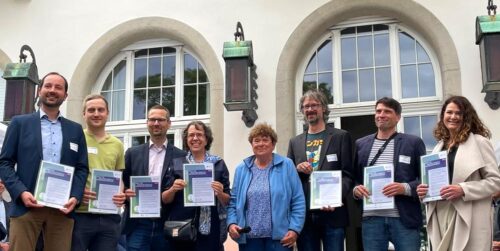The Association “Vereinigung von Freunden der Technischen Universität zu Darmstadt” honors the achievements of emergenCITY scientists in the field of this energy-self-sufficient house.
How can people be prepared for a long-term, nationwide power outage, and how can smart homes help? In the eHUB, an energy-self-sufficient, intelligent house on the Lichtwiese campus of TU Darmstadt, emergenCITY researchers are investigating how this can be achieved. They received the Prize for Sustainability and Interdisciplinarity for their work on Tuesday, May 29, 2025, at the Association of Friends of the Technical University of Darmstadt’s Spring Festival in the garden of the Lichtenberg House in Darmstadt.

The interdisciplinary collaboration of the 16 researchers from the five departments of Architecture, Computer Science, Electrical Engineering and Information Technology, Mechanical Engineering, and History and Social Sciences was particularly recognized. Between 2020 and 2023, they expanded the existing Solar Decathlon House at TU Darmstadt so that it could be used as a living laboratory and demonstrator in the LOEWE center emergenCITY. Close coordination between all disciplines was necessary time and again, both in formulating research questions and in the practical work on the building, which was largely carried out independently.
eHUB continues to receive positive feedback
“Technical innovations had to be based on a resilient infrastructure, but also structurally integrated and designed in an inclusive manner,” recalls Joachim Schulze, architect and emergenCITY scientist. Equally important was the question of social acceptance, which was answered in collaboration with political science. “The team is particularly pleased with the extremely positive response the eHUB continues to receive during tours and demonstrations.”
At the eHUB, scientists are researching, among other things, technical solutions that enable owners of photovoltaic systems to switch to emergency operation during a crisis and provide for themselves with limited energy resources. At the same time, they are exploring the extent to which they would be willing to share electricity with neighbors or critical infrastructure in an emergency, and what legal and technical challenges need to be overcome. Furthermore, the researchers are investigating, among other things, how multiple eHUBs can form a resilient network in the city to continue informing people in the event of a power outage and serve as a contact point in an emergency. Research will continue in the coming months: Among other things, they are developing a serious game that prepares people for crises in a playful way and further developing smart home warning systems. Research on the eHUB also has great potential to make the energy transition not only sustainable but also resilient.
The prize is endowed with 3,000 Euro
The prize is endowed with 3,000 Euros and includes a one-year, free membership with the Friends of TU Darmstadt. The association, with 2,200 members and 80 companies, has been supporting science at the TU Darmstadt since 1918. A total of three projects with a total of 10,000 Euro were awarded this year: the eHUB, the “Nachhaltige Labore” and “SWIVT II” projects. The Forum for Interdisciplinary Research and the TU Darmstadt Office for Sustainability were also involved in the selection process. In addition to sustainability and interdisciplinarity, the winners had to demonstrate scientific quality, creativity, and an impact on TU Darmstadt.
Click here to read the original article on emergenCITY.
